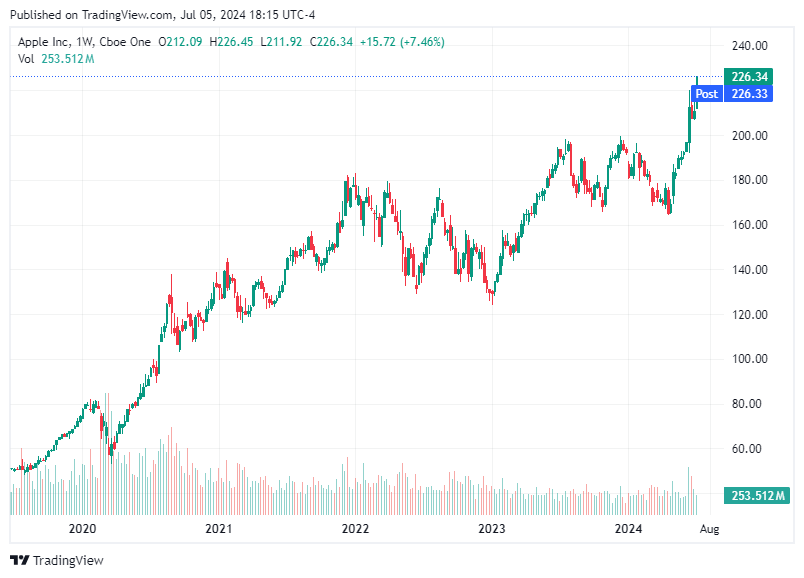Apple Publicly Criticized By Epic Games Over App Store Rejection
Epic Games Criticizes Apple for EU App Store Rejection.

Disclaimer: This article is a neutral, detailed summary of relevant events and does not include any commercial or promotional content. It is meant for informational purposes only.
Real-time information is available daily at https://stockregion.net
The ongoing contention between Epic Games and Apple has once again made headlines, highlighting issues within the tech industry. Epic Games, the creator of popular titles like Fortnite, has publicly criticized Apple for rejecting its Games Store application in the European Union. This move by Apple has reignited debates over its app store policies and their implications for competition and innovation. While Apple recently announced that it had approved Epic Games' marketplace app on iOS devices in Europe, the underlying tensions remain unresolved.
The conflict between Epic Games and Apple can be traced back to 2020 when Epic Games challenged Apple's practice of charging up to 30% commissions on in-app payments. Epic argued that this fee, imposed on transactions within apps available through the Apple App Store, was an abuse of Apple's market power and violated U.S. antitrust laws. The legal battle that ensued garnered widespread attention and brought to light broader concerns about Apple's control over its app ecosystem.
Epic's decision to introduce a direct payment system in Fortnite, bypassing Apple's payment mechanism, led to Apple removing the game from its App Store. This move prompted Epic to file a lawsuit against Apple, accusing the company of monopolistic practices. The case has seen developments, with both companies appealing various court decisions. The core issue remains Apple's tight control over its app distribution and payment systems, which many developers argue stifles competition and innovation.
The latest chapter in the Epic-Apple saga unfolded when Epic Games attempted to launch its Games Store on iPhones and iPads in Europe. According to Epic, Apple rejected the application twice, citing similarities in the design of certain buttons and labels to those used in the Apple App Store. Epic contended that its use of "Install" and "In-app purchases" naming conventions followed standard practices across multiple platforms and was in line with iOS app design guidelines.
In response to Apple's rejection, Epic turned to social media to voice its displeasure. In a series of posts on X (formerly known as Twitter), Epic labeled Apple's actions as arbitrary and obstructive. The company also claimed that the rejection violated the Digital Markets Act (DMA), a regulatory framework aimed at ensuring fair competition in digital markets. Epic shared its concerns with the European Commission, which had already initiated an investigation into Apple's app validation processes and the potential for sideloading alternative app stores.
Apple's Position
Apple's response to the criticism framed the issue differently. The company stated that the dispute concerned the Epic Sweden AB Marketplace, not the Fortnite app, which had already received approval. Apple maintained that its rejection was based on specific design elements that did not comply with its guidelines, rather than an attempt to block competition.
Apple's control over the iOS app ecosystem has been a point of contention for many developers. Earlier this year, Apple proposed changes to its App Store policies to comply with certain directives of the DMA, which went into effect in March. These changes included allowing alternative app stores on iPhones and providing an opt-out option from using Apple's in-app payment system. However, Apple introduced a "core technology fee," which many developers criticized as exploitative. This fee was seen as a way for Apple to maintain revenue from app transactions, even if developers opted out of using its payment system.
The involvement of the European Commission adds a dimension to this conflict. The Commission's investigation into Apple's app validation processes and the feasibility of sideloading alternative app stores reflects growing regulatory scrutiny of major tech companies. The DMA aims to ensure fair competition and consumer choice in digital markets, making it a crucial piece of legislation in this context.
The DMA's provisions are designed to prevent gatekeepers like Apple from imposing unfair conditions on businesses and consumers. By challenging Apple's rejection of its Games Store, Epic Games is essentially testing the effectiveness of the DMA in promoting competition and curbing monopolistic practices. The outcome of this dispute could have far-reaching implications for how digital markets operate and how companies like Apple regulate access to their platforms.
Developers and Consumers
The ramifications of this dispute extend beyond Epic Games and Apple, affecting developers and consumers alike. For developers, the ability to offer apps through alternative app stores on iOS devices represents a opportunity to reach users without adhering to Apple's stringent guidelines and fees. If Epic succeeds in its challenge, it could pave the way for other developers to launch their own app stores, fostering a more competitive and diverse app ecosystem.
For consumers, the availability of alternative app stores could lead to a wider range of apps and services, potentially at lower prices. Increased competition among app stores could drive innovation, as developers would have more freedom to experiment with different business models and features. It also raises questions about security and quality control, as alternative app stores may not adhere to the same standards as the Apple App Store. The conflict between Epic Games and Apple is emblematic of broader tensions within the tech industry. Major tech companies like Apple, Google, and Amazon wield power over their respective ecosystems, prompting concerns about their influence on competition and innovation. Regulatory bodies worldwide are increasingly scrutinizing these companies, seeking to balance their market power with the need for fair competition.
Apple's App Store policies have been a focal point of these regulatory efforts. Critics argue that Apple's control over app distribution and payment systems creates an unfair playing field for developers and limits consumer choice. Proponents of Apple's policies, however, contend that the company's guidelines ensure a secure and consistent user experience, protecting consumers from malicious apps and ensuring quality standards.
The outcome of the Epic-Apple dispute could set important precedents for how digital markets are regulated. If regulators side with Epic, it could lead to changes in how app stores operate and how companies like Apple interact with developers. This could, in turn, influence regulatory approaches in other jurisdictions, shaping the future of the tech industry. The ongoing conflict between Epic Games and Apple shows critical issues within the tech industry, particularly regarding app store policies and their impact on competition and innovation. Epic's challenge to Apple's rejection of its Games Store in the European Union has brought these issues to the forefront, highlighting the broader implications for developers, consumers, and the industry as a whole.
As regulatory bodies like the European Commission investigate and address these concerns, the outcome of this dispute could have far-reaching consequences. Whether it leads to greater openness and competition in digital markets or reinforces the status quo, the Epic-Apple saga is a defining moment in the evolving relationship between major tech companies and the regulatory frameworks that govern them.
Disclaimer: This article is a neutral, detailed summary of relevant events and does not include any commercial or promotional content. It is meant for informational purposes only.
Real-time information is available daily at https://stockregion.net


